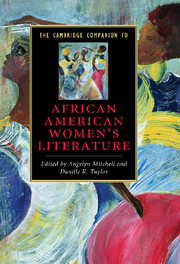Book contents
- Frontmatter
- Introduction
- Part 1 History, contexts, and criticism
- Part II Genre, gender, and race
- 6 African American women and the United States slave narrative
- 7 Autobiography and African American women’s literature
- 8 “Even some fiction might be useful”: African American women novelists
- 9 African American women poets and the power of the word
- 10 African American women in the performing arts
- 11 African American women writers of children’s and young adult literature
- 12 African American women essayists
- 13 African American women writers and the short story
- 14 African American women writers and popular fiction: theorizing black womanhood
- Bibliography
- Index
9 - African American women poets and the power of the word
from Part II - Genre, gender, and race
Published online by Cambridge University Press: 28 July 2009
- Frontmatter
- Introduction
- Part 1 History, contexts, and criticism
- Part II Genre, gender, and race
- 6 African American women and the United States slave narrative
- 7 Autobiography and African American women’s literature
- 8 “Even some fiction might be useful”: African American women novelists
- 9 African American women poets and the power of the word
- 10 African American women in the performing arts
- 11 African American women writers of children’s and young adult literature
- 12 African American women essayists
- 13 African American women writers and the short story
- 14 African American women writers and popular fiction: theorizing black womanhood
- Bibliography
- Index
Summary
One way to understand African American women's poetry - its historical evolution, its aesthetic beauty, its political power - is to start with the story of creation. According to biblical tradition, Adam was granted the power to name and this power was one measure of his authority over Eve, his wife, and Eve's predecessor, Adam's lesser-known wife Lilith. By naming everything in the world, Adam was defining what could be known and therefore controlling the nature of reality. That was his power. Legend also has it that Lilith, created from the clay like Adam rather than from his rib as Eve had been, would not relinquish the power of the word and subordinate herself to Adam simply because he was male. For her resistance, she was banished from Eden and cursed to devour her children. This story has been cited by well-known feminist critics Sandra Gilbert and Susan Gubar as an analogy for the difficulties women writers in Britain faced in seeking to speak for themselves in the face of a patriarchal society that privileged the status and culture of men. Not only was literary genius and its power to name defined in terms of male sexual potency, Gilbert and Gubar argue, but such definitions, when added to the conventions of aesthetic beauty that rendered women as objects, led women writers to doubt the legitimacy of their own imaginations. Placed in the context of the United States, this story illuminates how, with the effects of racism added to patriarchy, this dynamic of expression and exclusion, misnaming, self-doubt, and banishment becomes an even more devastating challenge to self-knowledge and creativity.
- Type
- Chapter
- Information
- The Cambridge Companion to African American Women's Literature , pp. 168 - 186Publisher: Cambridge University PressPrint publication year: 2009



